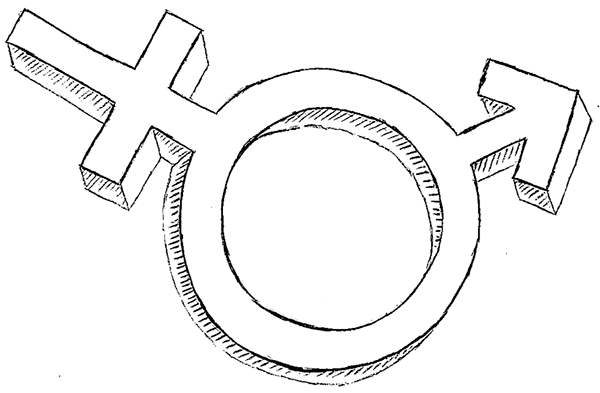Gender-neutral pronouns offer alternative to traditional gender binary
“I was writing a personal essay in an English class last year, and I was misusing the pronoun ‘they’ the entire essay. When I got it back (from my teacher), I was surprised that I had just become so used to using ‘they’ when talking about someone in general terms; it just seemed unnatural that there would be another pronoun to replace ‘they,’” said Corey Smith (‘16).
This is an experience that many students have been through. While writing an essay or story, talking in class, or simply speaking in a casual conversation, it is common to hit a roadblock when attempting to correctly use a pronoun in order to refer to people when their genders are unknown or unclear.
Most commonly, gender neutral pronouns are used to address people who may not fall under a ‘male’ or ‘female’ category. While the pronouns “he/him/his/her/she/hers” force people to choose a certain gender, gender neutral pronouns lessen the pressure to pick a side and allow individuals to maintain their own gender identities.
Pronouns are words used rapidly by people every day, and as a result, there has been controversy surrounding the adaptability of a new pronoun into the English language. The pronoun “they” can be used to describe a group of people made up of men and women, or a group of people with unknown genders. Technically, the pronoun “they” should not be used as a singular pronoun. However because of the familiarity of this singular usage of “they,” many people say that they would find it difficult to adapt to an entirely new word with the same meaning.
However, grammar is not the only problem pushing people to switch to these pronouns. “It’s really about respect,” said Gabe Pine (‘15), one of the leaders of Gay Straight Alliance (GSA) at Urban. “Someone who uses gender neutral pronouns might feel weird or wrong or uncomfortable being called ‘he’ or ‘she,’ so it’s really important to call people by the pronouns they want.”
“The usage of gender neutral pronouns is important because some individuals either don’t identify as male or female, identify as both, or would simply rather people use gender neutral pronouns when talking about them, for their own personal reasons,” said Daniela Sweet-Coll (‘16).
As vital as these pronouns are to making someone feel comfortable and respecting his or her identity, students agree that Urban could do more to address the usage of gender neutral pronouns.
“(Urban) does a better job than a lot of schools,” said Sophie Drukman-Feldstein (‘16). “At some events I’ve been to (outside of Urban) people introduce themselves with their names and pronouns, and I think it would be great if Urban did that, not just at GSA but also in classes and advisories. One way Urban could do better is by not assuming everyone is cisgender.” Cisgender is someone whose gender corresponds to their biological sex (e.g., male, man).
However, asking people to name their preferred pronouns during introductions carries with it the joke of trivially throwing around the term “self-identify.” “It becomes the go-to for making fun of our maybe overly-cautious ways of going about discussions of identity and difference,” said Isabel Bronston-Joseph (‘15), co-leader of GSA along with Pine.
On the other hand, others believe that the adoption of an entirely new pronoun would be complicated and in some ways, unnecessary. “I’m not against the use of these pronouns, for me it’s just super confusing. I have read a lot about it and I think when meeting someone new, I don’t necessarily think about what pronoun to use to describe them. I think it’s great if there is a pronoun to just describe everyone because when I meet someone new their gender is not necessarily the first thing I think about,” said Sonia Fillipow (‘16).
In the debate over pronouns, people now have a chance while writing or talking to choose which pronouns they use to describe different people. With the English language rapidly expanding, the usage of gender neutral pronouns not only pushes people to use correct grammar but also allows them to choose and define their own identities without being forced into a box.













